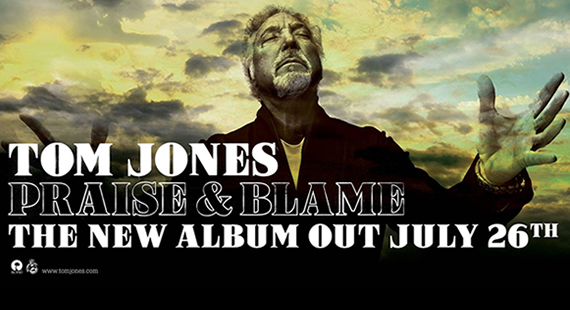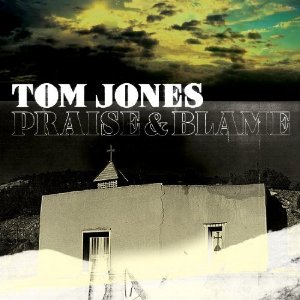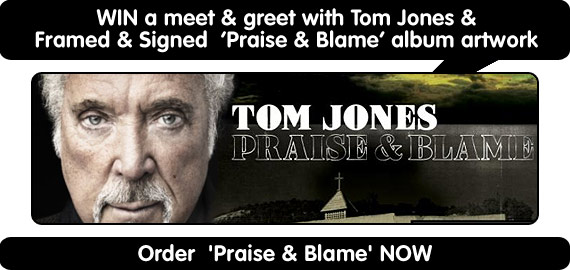 Q had the pleasure of meeting up with Wales' greatest export Sir Tom Jones last week to discuss his rootsy new album Praise And Blame. Autographing an album for a fan, he pauses to spell 'Happy Birthday'. "I'm dyslexic, you know?... I know 'birthday' is 'ir' but it should be 'er' - I mean, that's how it sounds, 'berthday'." Maybe it's learning difficulties. Or perhaps it's just a matter of Wales having never left Tom Jones; which would be one explanation for why he's recorded an album of the music he enjoyed in church as a boy in Pontypridd. Mostly, the Tom Jones we see now is laying everything bare.
With that in mind, when a rep from his record label Island brandished the whole thing "a joke", you'd think it would hurt. But as the Godfather of pop would probably have it, it's just par for the course in the pop industry. Speaking authoritatively (and emphasising every phrase in that gravelly Welshman's tone) about the gospel origins of rock'n'roll and getting back to where it all started, Tom explains how he's been told he doesn't "fit in" since the release of his first hit single, It's Not Unusual. It would appear however that, for this "joke", it's Tom Jones who may just have the last laugh. Seventy years old; his voice better than ever; still "kicking the shit out of everything": 'unusual' doesn't do him justice.
Q had the pleasure of meeting up with Wales' greatest export Sir Tom Jones last week to discuss his rootsy new album Praise And Blame. Autographing an album for a fan, he pauses to spell 'Happy Birthday'. "I'm dyslexic, you know?... I know 'birthday' is 'ir' but it should be 'er' - I mean, that's how it sounds, 'berthday'." Maybe it's learning difficulties. Or perhaps it's just a matter of Wales having never left Tom Jones; which would be one explanation for why he's recorded an album of the music he enjoyed in church as a boy in Pontypridd. Mostly, the Tom Jones we see now is laying everything bare.
With that in mind, when a rep from his record label Island brandished the whole thing "a joke", you'd think it would hurt. But as the Godfather of pop would probably have it, it's just par for the course in the pop industry. Speaking authoritatively (and emphasising every phrase in that gravelly Welshman's tone) about the gospel origins of rock'n'roll and getting back to where it all started, Tom explains how he's been told he doesn't "fit in" since the release of his first hit single, It's Not Unusual. It would appear however that, for this "joke", it's Tom Jones who may just have the last laugh. Seventy years old; his voice better than ever; still "kicking the shit out of everything": 'unusual' doesn't do him justice.
Q: Hi Tom, are you having a good day?
Tom Jones: Yeah, yeah, good. [Points to part-consumed glass] I'm having a beer at the end of it.
Q: Everything from the colour of your hair now to the way you've recorded Praise And Blame says "exposed". Would you say this is the most laid bare phase in your career so far?
TJ: Yeah, yeah, I think so. You know, it's the most natural sound that I've recorded and the most live. It sounds like if you're in a room, you know what I mean? If you're singing live in a place. It doesn't sound like a 'recording' as such. That's what I like about it. It's really well done thanks to Ethan Johns; he's the man that produced it and played on it. He was a big part of the atmosphere of the whole thing.
Q: It really comes out at you. Would you say it's your voice that you want people to focus on now?
TJ: Yes. These songs need to have a sound like that. You don't need much orchestration. The songs are so strong that they speak for themselves. All I had to do was sing 'em, you know? Of course, you have to put feeling into them. But that was already in the songs; you didn't have to over-emphasise anything, just let it flow. What Good Am I? - the Bob Dylan song - I sang that and Ethan was right, he said, "Don't sing it too loud. Try and sing it as softly as you can... restrained." Rather than trying to enunciate every word, every syllable, it didn't need it. I think we captured it.
Q: Would you say then that this was a totally different recording experience from anything you've done up till now?
TJ: Yeah, well it's a bit like going back to the start when I used to sing in Wales in clubs and pubs and dancehalls. I'd have a group - a rhythm section - and we'd get in the pub and we'd rehearse. We'd move songs around and try different ways to do things, rather than just copy the records that were out at the time. This felt like that to me. We moved things around. We'd say, "let's try it like this" or, "let's try it a little faster", "maybe we should change the key here". When they clicked, it was like "Yeah, that's it." We didn't settle for less. We didn't settle for, "Oh, that's good." Not yet. We'd keep kicking it around until we got it to where we wanted it. That was very similar to when I started.
Q: Is this the record you "always wanted to make", or is it as cut and dry as the fact that you were turning 70 and just wanted to enjoy something different?
TJ: No, it's something that's been in me for many years. But it's been difficult to get a record company to go along because it is a "concept" album. Most record companies, and rightfully so, want to sell records and have songs on the radio so it has to be radio friendly and there has to be singles. But getting back to the start, when I recorded It's Not Unusual it was different from records that were around. So that wasn't 'radio friendly'. The BBC wouldn't play it! They didn't understand it. The Beatles were in their prime and the Stones... it was a big British band invasion. So for single performers it was more difficult. Especially when you come up with, you know, brass, larger-than life, straight-in-yer-face sound [laughs].
Saying that, it was different enough to be played. But sometimes it's more difficult to get something like that across than it is with things that are more similar to what's going on. And I feel that's what this record is now. Some radio stations won't play it. They say it doesn't fit in. Well OK, but, you know, play one!
Q: Like you, they need to take a risk...
TJ: Yeah, see what the people think! At the end of the day it's up to the public. If they like something they let you know. If they don't, they let you know that too. At least play it! Don't say, "It doesn't fit in". It's not supposed to fit. This is a spiritual album, but take it on face value. What do the songs sound like? Are they striking or moving? That's what I like to do. I want to make records that have some power. It could be a dance record or a ballad, but it needs to be powerful.
Q: It needs to be from the heart, then?
TJ: Exactly! It needs to be honest. It needs to sound real. To me that's what this record sounds like. So, yes I've been waiting a long time to do it. And with my age, I think my voice sounds different to when I was young. It's a natural thing. You know, your voice gets richer, not weaker. My voice is as powerful now as it was. But I think it's richer and some of these songs benefit from that. Like, What Good Am I? You know what I mean? The low notes. And Nobody's Fault But Mine. So there's a time for certain things.
Q: Originally, It's Not Unusual was written with Sandie Shaw in mind. Do you think, had she recorded it, it would have been deemed more radio friendly?
TJ: Yes it would have been. But thank God she liked it the way it was! Afterwards they said, "She doesn't wanna do it." It was a great opportunity for me to record it because it was only a demo that I did that we sent to her. When I met her she said, "I didn't wanna do it because I didn't think I could do it." The two guys who wrote it - Gordon Mills and Les Reed - tried to put it in a vein that would suit her cos she had songs with that [starts singing intro] "dung du-dung" so they stuck it in that beat so it would appeal to her. But when I sang it, you see, it took it... somewhere else [laughs]. I dug into it.
It sounded like a hit record to me when I did the demo and I stuck to my guns and said, "I have to have this record". My producer Peter Sullivan said, "Look, if you want to do this, we've gotta kick it." It couldn't just be a mild song, which it was originally. "We have to hit it hard because you have this big voice." So thank god Les Reed came up with that brass which gave me room to smack it. Then it became as powerful as it is.
But that's what makes records great - that they're not like something else, that they're individual. [Raises eyebrow] Radio is not that open to that. In those days it was the pirate radio stations like Radio Caroline who loved it and played it. They're the ones I have to thank for at least getting it on the airwaves. And then, you know, the bloody thing went like a rocket! The BBC had to play it then, of course, cos it was Number 1! [laughs].
Q: It's all part of that industry age-old war of the push and pull between image/what sells and artistic integrity. That's something that seems to always plague pop artists, and apparently still you?
TJ: Yeah. When I was young and when I was wearing tight pants, you know, I though that my voice would over-power any negativity that people saw in me. And I was young, I was vibrant and I loved to dance and I wanted to get on it and kick the shit out of everything, you know what I mean? Like young people do. [Shrugs and smiles] Well, I still do that anyway, but... I was aggressive. And people would say, "Oh yeah, Tom Jones with the tight pants." And I thought, "Oh Jesus, what about my voice?" I wouldn't be on the stage if it wasn't for my voice; there's the power, there's the thing. But sometimes, without knowing it, people are seeing rather than hearing. So I've learned, after all this time, that I have to be careful with that now. More careful in the way that I look. Just concentrate on the music.
Q: Your voice is an incredible instrument still to this day. How have you cared for it over the years?
TJ: I know not to abuse it. I used to do two shows a night and it's ok for a while but then if you keep doing it you start to sing on tired chords and you can damage them. But that's trial and error. I've learned to take care of it more than when I was young. It's all down to drinking plenty of water, get rest, some sleep. It's like an athlete. You have to give muscles rest so that they work properly. Singers are very similar to athletes because it's part of your body that's producing the sound, it's not like playing an instrument. The instrument is right there in your throat! And be careful that you don't drink too much booze [Q looks to Tom's glass of beer]. Well, especially before you sing. Afterwards is another story. [Laughs] I'm not singing today so I'm having a beer.
Q: For you, you've continued for so long because you just love to sing. Is there any day for you that doesn't involve music?
TJ: No, not really. I'm always listening. There's always music. Music's going round my head all the time. Even if I'm not singing, you know, I'm whistling. People make fun of me, my family especially because when I walk out the bedroom I'm [starts whistling] and they go [whistles response]. I say, "I hope I don't whistle that bad" [laughs]. It's always some form of music in my head, or I'm listening to CDs, and of course, old vinyl. I've still got old records that I love to listen to.
Q: You started out as a rhythm and blues singer. Was gospel something you were listening to from an early stage and it's stayed with you all these years, too?
TJ: Oh yeah, yeah. Singing hymns in chapel when I was a kid, you know. Singing in school, there were a lot of religious songs. When rock'n'roll kicked off in the '50s, it's just like it was a vibrant new sound. But the more you listen to it, the more you realise that it's coming from a gospel place. The roots are bluesy, gospel music. And I think that's what upset people when they said, "It's the Devil's music." It was very close to religious music in its structure. It was just that the words were different. I think that's what upset 'em. If it had been a music that wasn't connected I don't think it would've upset that many people. [Knowingly] But sometimes it's good to upset people cos then they'll take note.
Q: Elvis was at the forefront of rock'n'roll and he came from a gospel background. Is it true you played gospel with The King?
TJ: Yeah, we used to sing it together at night, after we did the shows in Vegas. We'd go back to his suite. That's what he loved. If Elvis was going to sing something just on the spur of the moment, it would be a gospel song. But he loved to have singers with him. I mean, that's how he was brought up, I'm sure of it. Going to the church that he went to as a kid they had people doing these answer phrases, and then he would join in. So he loved that, he loved to hear voices. He was surprised to know that I knew so many of the gospel songs. He'd say, "Oh, how do you know that one? Do they sing gospel in Wales?" I'd say, "Yeah, but not exactly the same way." [Laughing] It's more like hymns. People in the South got a hold of hymns and it became gospel. That's where the roots are and that's what this record is. The structure of those songs is very natural to me. Songs like Strange Things Happening Every Day; Sister Rosetta Tharpe. She did gospel like that, she played electric guitar when she sang. She was like a rock'n'roll singer singing religious songs, really.
Q: You debuted the album in a church a few months back. Beyond the musicality of these songs, lyrically they're a lot deeper. All the glitz and glamour has been stripped away. When you're singing a song like What Good Am I? is there that genuine self-doubt?
TJ: Yes, well the song itself makes you think: what good am I if I just stand by and let things happen when I can make a change? You should speak up. Those things, the lyrics affect me when I'm singing. That's why Ethan told me to restrain it. It worked when I whispered parts, rather than sung them. When I was growing up in Wales and playing in pubs there were no microphones so you had to enunciate and make things larger than life to get across. Sometimes you have to try and hold that back. It's a habit that I got into by projecting but some songs you don't need to. They need to be treated with a tender attitude. Less is more. Which I never realised before [Smiles].
Q: Less is more is the new Tom Jones...
TJ: Well, it's an honest album. I loved recording it. Listening to the stuff back was a joy. You gotta treat things the way you think it should be treated. The songs are of a certain kind and the message is the same. You just have to think and realise, there are Strange Things Happening Every Day. And If I Give My Soul. And Trouble Me. You know, "If I let things stand that should not be, my Lord will trouble me." He'll say, "Hey!" Which has happened to me. So I've experienced that.
Q: So, you are a God fearing man?
TJ: Oh yeah, definitely. Definitely! I pray every night. I get on my knees and thank god first of all for giving me a voice. Giving me the instrument to allow me to be myself and do something that I love to do for so long. Hopefully I'll keep it until I drop!
Q: You've collaborated with so many people over the course of your career. Is there anybody you missed out on that you regret?
TJ: Ummm. Well, I would love to have recorded with Elvis Presley but he wasn't allowed to do it at the time.
Q: Is there a reason for that?
TJ: Tom Parker, you know? He wanted to keep him away, he didn't want him to mix with anyone or be seen. It was a shame because Elvis wanted to. He would have loved to do duets with people. He wasn't afraid to do anything. But I sang with Jerry Lee Lewis on my TV show so I got that done and Little Richard, Wilson Pickett, I sang with Chuck Berry on a midnight special in the States. Most of it I got done. I think Whitney Houston's got the best voice. I know she's shakey at the moment. But I think she had the best natural female voice that I've heard. Maybe that could still happen.
Q: You grew up training your voice on your idols like Jerry Lee Lewis. As the Godfather of pop, as it were, if you were start out all over again, would you say there people now that you could draw inspiration from? Or has pop changed too much?
TJ: No I think there's individual people about. Like Kings Of Leon. I think they come from a Southern, gospel-y, old time rock'n'roll thing. I don't think music has changed that much since 1955 when Rock Around The Clock came out - you know Bill Haley & The Comets. They concentrated more on making those instruments larger than life. That's why those records sounded so different. It came from gospel. Pop before that came from a jazzy style - the big band era. Singers were balladeers, they sang with a singing voice.
When Tony Bennett recorded the Hank Williams song Cold Cold Heart he was the first mainstream singer to have a hit with a country song and I thought, "Wow! That's great, he's done that." But I saw a documentary - when they presented the song to Tony Bennett he didn't like it. And I thought, "Owwww". It blew that thing out of the water. They twisted his arm. But he did a great version and it did the trick; it brought country music to people who wouldn't listen to it before. It's like what happened with the blues with British bands. BB King said if it wasn't for British rock bands the blues might've died. They came in with a new thing and then people wanted to know what the original sounded like. It's always good to bring stuff to light.
Q: So whether it's early gospel or modern rock, you're representing something contemporary in a very roundabout way...
TJ: Yeah. It's all based on what happened from that time on. The Beatles always said that. They were listening to '50s rock'n'roll music. That's what influenced the British invasion. This is almost like getting (back there)... there's a song on here called Run On which a lot of gospel groups did. The one I knew was Elvis's version. He did it... you know... Elvis... [starts singing with Elvis impression], "Well, you may run on for a long time." And the group go, "Run on for a long time." So we did it in the same key and I'm thinking, "I sound like Elvis! [Laughs] We gotta get away from that." So we lifted the key. Ethan Johns said, "Let me get a rock guitar lick here. We'll rock it up!" I thought, "Wow! We're gonna rock something up even more than Elvis did!" [Laughing] Woooh! To me, it sounds even more authentic. It's a hot, gospel, thumping thing.
Q: In a nutshell, it's all pop and if radio learned anything from It's Not Unusual they should absolutely get it on the air?
TJ: Exactly, yeah. I mean, Jesus!
Tom Jones's new album Praise And Blame is out now on Island Records.
Words: Eve Barlow
Read the interview here
 After weeks of fantastic reviews, controversy and brilliant interviews, the day we’ve all been waiting for is finally here… 'Praise & Blame' is out to buy now!!!
After weeks of fantastic reviews, controversy and brilliant interviews, the day we’ve all been waiting for is finally here… 'Praise & Blame' is out to buy now!!!
 Q had the pleasure of meeting up with Wales' greatest export Sir Tom Jones last week to discuss his rootsy new album Praise And Blame. Autographing an album for a fan, he pauses to spell 'Happy Birthday'. "I'm dyslexic, you know?... I know 'birthday' is 'ir' but it should be 'er' - I mean, that's how it sounds, 'berthday'." Maybe it's learning difficulties. Or perhaps it's just a matter of Wales having never left Tom Jones; which would be one explanation for why he's recorded an album of the music he enjoyed in church as a boy in Pontypridd. Mostly, the Tom Jones we see now is laying everything bare.
With that in mind, when a rep from his record label Island brandished the whole thing "a joke", you'd think it would hurt. But as the Godfather of pop would probably have it, it's just par for the course in the pop industry. Speaking authoritatively (and emphasising every phrase in that gravelly Welshman's tone) about the gospel origins of rock'n'roll and getting back to where it all started, Tom explains how he's been told he doesn't "fit in" since the release of his first hit single, It's Not Unusual. It would appear however that, for this "joke", it's Tom Jones who may just have the last laugh. Seventy years old; his voice better than ever; still "kicking the shit out of everything": 'unusual' doesn't do him justice.
Q had the pleasure of meeting up with Wales' greatest export Sir Tom Jones last week to discuss his rootsy new album Praise And Blame. Autographing an album for a fan, he pauses to spell 'Happy Birthday'. "I'm dyslexic, you know?... I know 'birthday' is 'ir' but it should be 'er' - I mean, that's how it sounds, 'berthday'." Maybe it's learning difficulties. Or perhaps it's just a matter of Wales having never left Tom Jones; which would be one explanation for why he's recorded an album of the music he enjoyed in church as a boy in Pontypridd. Mostly, the Tom Jones we see now is laying everything bare.
With that in mind, when a rep from his record label Island brandished the whole thing "a joke", you'd think it would hurt. But as the Godfather of pop would probably have it, it's just par for the course in the pop industry. Speaking authoritatively (and emphasising every phrase in that gravelly Welshman's tone) about the gospel origins of rock'n'roll and getting back to where it all started, Tom explains how he's been told he doesn't "fit in" since the release of his first hit single, It's Not Unusual. It would appear however that, for this "joke", it's Tom Jones who may just have the last laugh. Seventy years old; his voice better than ever; still "kicking the shit out of everything": 'unusual' doesn't do him justice. Michael Hann, guardian.co.uk, Thursday 22 July 2010 23.30 BST
Michael Hann, guardian.co.uk, Thursday 22 July 2010 23.30 BST ‘Who in the hell is Tom Jones?’ spat Charles Bukowski. It’s a good question. The Tom Jones he wrote about in Hollywood is a slick Vegas showman, “his shirt is open and the black hairs on his chest show. The hairs are sweating.” The Tom Jones I meet is a white-haired Welshman about to release an album of blues and gospel so out of character that the vice-president of his own record label called it a “sick joke”. So just who in the hell does Tom Jones think he is?
‘Who in the hell is Tom Jones?’ spat Charles Bukowski. It’s a good question. The Tom Jones he wrote about in Hollywood is a slick Vegas showman, “his shirt is open and the black hairs on his chest show. The hairs are sweating.” The Tom Jones I meet is a white-haired Welshman about to release an album of blues and gospel so out of character that the vice-president of his own record label called it a “sick joke”. So just who in the hell does Tom Jones think he is? To celebrate the release of Tom Jones' Praise & Blame',
To celebrate the release of Tom Jones' Praise & Blame',  A French expression best describes the latest news from a Welsh phenomenon-Tom Jones has gone au naturel, and not just by finally letting his grey hair show.
Just weeks after his 70th birthday, the legendary singer adds another page to his résumé with the release of his gospel-flavored album "Praise & Blame." Released July 27 in North America on Lost Highway, and a day earlier internationally on Island, the record launches Jones' new worldwide deal with Universal and is, by his own description, the most back-to-basics recording he's ever made.
A French expression best describes the latest news from a Welsh phenomenon-Tom Jones has gone au naturel, and not just by finally letting his grey hair show.
Just weeks after his 70th birthday, the legendary singer adds another page to his résumé with the release of his gospel-flavored album "Praise & Blame." Released July 27 in North America on Lost Highway, and a day earlier internationally on Island, the record launches Jones' new worldwide deal with Universal and is, by his own description, the most back-to-basics recording he's ever made.